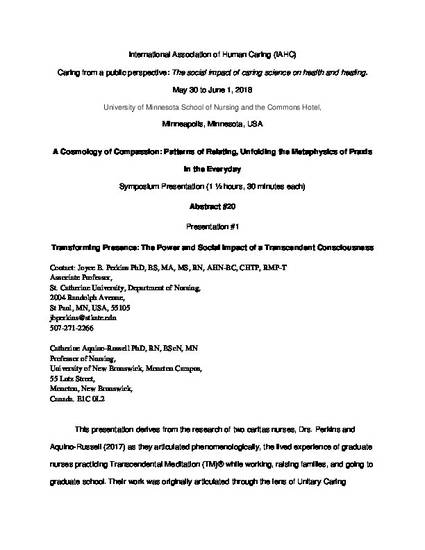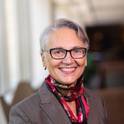
Presentation
A Cosmology of Compassion: Patterns of Relating, Unfolding the Metaphysics of Praxis in the Everyday Symposium Presentations (1½ hours, 30 minutes each) 3 Abstract Presentations: #1 Transforming Presence: The Power and Social Impact of a Transcendent Consciousness; Abstract Presentation #2: Embracing Caritas Literacy: Caritas Processes and Consciousness of the Expert Nurse in Unitary Human Caring Science; and Abstract Presentation #3: Educating the Caritas Nurse: Developing Curriculum for Practicing Within a Unitary Human Caring Science.
International Association of Human Caring (IAHC) Caring from a public perspective: The social impact of caring science on health and healing. May 30 to June 1, 2018
(2018)
Abstract
Abstract Presentation #1 Transforming Presence: The Power and Social Impact of a Transcendent Consciousness Joyce B. Perkins PhD, BS, MA, MS, RN, AHN-BC, CHTP, RMP-T, ACE-GFI Catherine Aquino-Russell PhD, RN, BScN, MN
This presentation derives from the research of two caritas nurses, Drs. Perkins and Aquino-Russell (2017) as they articulated phenomenologically, the lived experience of graduate nurses practicing Transcendental Meditation (TM)® while working, raising families, and going to graduate school. Their work was originally articulated through the lens of Unitary Caring Science, and later, the Caritas Processes ® at the Rogerian Scholars Conference in Arizona (October, 2017). This presentation speaks to the power of presence and the unitary field as each nurse learned to resonate in coherent and harmonic fashion in each nursing situation, to the other, and to the core of creation (Perkins, 2018, submitted) known as the unitary, quantum, or caritas field in nursing. This sense of the sacred and connection to innate wisdom/intuition was imbued within each nursing situation as the values of respect and dignity for all humanity and creation prevailed. Values of care, compassion, gratitude and appreciation were noted in student expressions that transformed conditions of reality such that they functioned as expert nurses within stressful situations at work and school over the 4-month period of time in this study. This quick transformation within self, a maturing or evolution of consciousness (Newman, 1994), has been documented in the TM literature (Orme-Johnson, 2017a,b,c; Orme-Johnson & Walton, 1998; Travis, et al., 2009; Travis, 2000) and is being taught to nursing students in Canada in a landmark study (Aquino-Russell, Aldiabat, O’Donnell, & Whalen, 2017) such that they have more confidence and resilience to stress within. This quality of stress resistance and heartfelt connection to all creation is magnified as we share within our teaching–learning institutions ways of being that reflect how we wish to shape ourselves as social beings on planet earth.
Abstract Presentation #2: Embracing Caritas Literacy: Caritas Processes and Consciousness of the Expert Nurse in Unitary Human Caring Science Joyce B. Perkins PhD, RN, AHN-BC, CHTP
Newman, Sime, and Cocoran-Perry (1991) wrote of the particulate/determinate, interactive/integrative, and unitary/transformative paradigms of nursing in their article entitled Focus of the Discipline. Newman (1994) later, articulated Health as Expanding Consciousness. From this article and book, perspectives were sorted into three paradigms or worldviews of consciousness, all embedded within the being, feeling, knowing, doing, and becoming of the nurse as a unitary whole. Further, Watson and Smith (2001) merged Rogerian (1971) concepts of unitary human beings with caring science (Watson, 2001) to become unitary caring science. Newman, Smith, Pharris, and Jones revisited the focus of the discipline in 2008. Seven unitary concepts of: pattern, meaning, consciousness, mutual process, caring, presence, and health emerged as central to a unitary caring science and the practice of nursing.This presentation describes how Watson’s (2008) Caritas Processes ® help to shape emerging aspects of a nurse’s conscious heart into patterns of an expert nurse (Benner, 1982). The virtual domain of the quantum (energy) field, as first described in nursing by Roger’s (1970) is the ground of being in the presence of an expert nurse. Healing happens as coherence of frequency in the heart and mind patterns of the nurse, radiate into the field of practice, with a caring consciousness. Information is distributed throughout that field instantaneously and pan dimensionally, rather than linearly. The intuition or tacit knowing of the expert nurse in coherent processing is attuned to that field when in mutual relationship with a person. Healing happens as attention and intention bring forth the highest good in that nursing situation. Virtuosity (Perkins, 2017, submitted) develops in nursing practice within the unitary/transformative paradigm as caritas literacy (Lee, Palmieri, & Watson, 2017) unfolds. The social impact of a caring consciousness built within individuals is shared resonantly within the collective consciousness of the whole.
Abstract Presentation #3: Educating the Caritas Nurse: Developing Curriculum for Practicing Within a Unitary Human Caring Science Cynthia Lee Dols Finn DNP, RN, PHN, CNE HTI-PA; Beth Cunniff, MSN, RN, CNE, CPNP; Katie Molitor, MAN, RN; Kjersti Nelson, RN, MSN; Erin Magnuson, RN, BAN, MSN student & Joyce B. Perkins PhD, BS, MA, MS, RN, AHN-BC, CHTP, RMP-T
St. Catherine University initiated curriculum development of a multicultural and holistic baccalaureate (BSN) section for adult learners in 2015. Students began matriculation in Fall 2017. This initiative was founded on an “ethic of belonging” (Watson, 2005 a,b) and embraced unitary human caring science. Unitary concepts of health, pattern, meaning, consciousness, caring, presence, and mutual process (Newman et al., 2008) were used to guide a conceptual/contextual teaching-learning process of spiraling from simple, to complicated, and finally complex nursing situations of multicultural groups. Development of awareness (expanding consciousness) within the student was facilitated via use of the Caritas Processes® (Watson, 1979, 1985, 1999, 2005a, 2008, 2012) and caring attributes or modes of caring first articulated by Roach (2013). This program is based on core values of social justice, diversity, ethics, caring, excellence, holism, integrity, and patient-centeredness as described by the National League of Nursing (2010). Unique approaches to developing caritas literacy (Lee, Palmieri, & Watson, 2017) are articulated in classroom, laboratory, simulation, clinical, and online experiences in this hybrid program. Students dwell within the caritas field created by faculty as they attune to their true purpose in life. Nursing is practiced as a “calling” rather than a vocation as students discover what is of value and what is real for them. Meditation, contemplative practices, reflective dialogue, and holistic therapies are shared alongside practices of Western medicine. In this way, the heart of the collective group, as social or cultural consciousness, unfolds a pattern of relating and healing that is sustainable for all. Praxis, the art and science of nursing in practice, brings forth compassionate action in the world and cosmos.
Disciplines
- Nursing and
- Other Nursing
Publication Date
Spring May, 2018
Location
Minneapolis, MN
Citation Information
Joyce B Perkins. "A Cosmology of Compassion: Patterns of Relating, Unfolding the Metaphysics of Praxis in the Everyday Symposium Presentations (1½ hours, 30 minutes each) 3 Abstract Presentations: #1 Transforming Presence: The Power and Social Impact of a Transcendent Consciousness; Abstract Presentation #2: Embracing Caritas Literacy: Caritas Processes and Consciousness of the Expert Nurse in Unitary Human Caring Science; and Abstract Presentation #3: Educating the Caritas Nurse: Developing Curriculum for Practicing Within a Unitary Human Caring Science." International Association of Human Caring (IAHC) Caring from a public perspective: The social impact of caring science on health and healing. May 30 to June 1, 2018 (2018) Available at: http://works.bepress.com/joyce-perkins/13/
